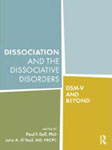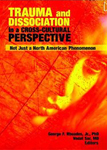 Dissociation and the Dissociative Disorders
Dissociation and the Dissociative Disorders
DSM-V and Beyond
Edited by Paul F. Dell, and John A. O’Neil.
Dissociation and the Dissociative Disorders is a book that has no real predecessor in the dissociative disorders field. It (1) reports the most recent scientific findings and conceptualizations about dissociation, (2) defines and establishes the boundaries of current knowledge in the dissociative disorders field, (3) identifies and carefully articulates the field’s current points of confusion, gaps in knowledge, and conjectures, (4) clarifies the different aspects and implications of dissociation, and (5) sets forth a research agenda for the next decade.
 The Dissociative Identity Disorder Sourcebook
The Dissociative Identity Disorder Sourcebook
Author: Deborah Haddock
The Dissociative Identity Disorder Sourcebook serves as a much-needed bridge for communication between the dissociative individual and therapists, family, and friends who also have to learn to deal with the effects of this truly astonishing disorder.
 The Haunted Self: Structural Dissociation and the Treatment of Chronic Traumatization
The Haunted Self: Structural Dissociation and the Treatment of Chronic Traumatization
Authors: Onno van der Hart, Ellert R. S. Nijenhuis, Kathy Steele
In this book, three leading researchers and clinicians share what they have learned from treating and studying chronically traumatized individuals across more than 65 years of collective experience.
 Traumatic Dissociation: Neurobiology and Treatment
Traumatic Dissociation: Neurobiology and Treatment
Editors: Eric Vermetten, M.D., Ph.D., Martin J. Dorahy, Ph.D., and David Spiegel, M.D. Arlington, Va.,
American Psychiatric Publishing, 2007
(From a review by Samuel R. Chamberlain, MA): In their welcome book, Eric Vermetten and co-editors bring together contributions from a variety of experts in order to chart the ascent of traumatic dissociation, beginning with Piaget and Freud, moving on to DSM, and thence the neurosciences, translational medicine, contemporary controversy, and treatment.
 Forensic Aspects of Dissociative Identity Disorder
Forensic Aspects of Dissociative Identity Disorder
Editors: Adah Sachs, Graeme Galton
This collection of essays by a range of distinguished international contributors explores the complex legal, ethical, moral, and clinical questions which face psychotherapists and other professionals working with people suffering from Dissociative Identity Disorder. Contributors to this book are drawn from the following professions: psychotherapy, psychoanalysis, counselling, psychology, medicine, law, police, and social work.
 The Stranger In The Mirror
The Stranger In The Mirror
Author: Marlene Steinberg
Psychiatrist Steinberg puts her considerable research and clinical experience to the purpose of making it clear that DID is a “hidden epidemic,” that many of its sufferers are misdiagnosed and fail to receive proper early treatment, and that the sensationalism of many MPD cases of yore (e.g., The Three Faces of Eve) has warped physicians’ as well as public attitudes. William Beatty.
 The Body Remembers: The Psychophysiology of Trauma and Trauma Treatment
The Body Remembers: The Psychophysiology of Trauma and Trauma Treatment
Author: Babette Rothschid
Illuminates the value of understanding the psychophysiology of trauma for both clinicians and their traumatized clients. This is the first book to link this phenomenon of somatic memory and the impact of trauma on the body. Reducing the chasm between scientific theory and clinical practice and bridging the gap between talk and body therapy, Rothschild presents techniques for addressing the memory in the body.
 Traumatic Experience and the Brain: A Handbook for Understanding and Treating Those Traumatized as Children
Traumatic Experience and the Brain: A Handbook for Understanding and Treating Those Traumatized as Children
Author: dave Ziegler
This book is the result of the authors three decades of experience with children traumatized by abuse and/or neglect. This book details the effect of such trauma on the developing brain, describing how it actually rewires one’s perceptions of self, others, and the world.
 Trauma And Dissociation in a Cross-cultural Perspective: Not Just a North American Phenomenon
Trauma And Dissociation in a Cross-cultural Perspective: Not Just a North American Phenomenon
Editors: . George F. Rhoades Jr., Vedat Sar
Reactions to trauma can be both unique according to a person’s culture and similar to the experiences of others around the world. Dissociation, intense grief, anger, and survivor’s guilt are common responses as people split off mentally, physically, and emotionally from the source of the trauma, whether it’s an act of nature (tsunami, earthquake, flood, etc.) or the trauma created by violence, physical, sexual, and emotional abuse, assault, confinement, kidnapping, and war. Trauma and Dissociation in a Cross-Cultural Perspective examines the efforts of clinicians and researchers in Europe, Asia, the Middle East, South America, Australia, and New Zealand to develop sociopsychological methods of providing counseling to people who are suffering physically, emotionally and spiritually, training for professionals counted on to dispense that counseling, and economic and political solutions that might help to limit the devastating effects of natural disasters.
 Trauma and Recovery: The Aftermath of Violence–from Domestic Abuse to Political Terror
Trauma and Recovery: The Aftermath of Violence–from Domestic Abuse to Political Terror
The Diva Says: This one is a must for your library!
Author: Judith Herman, M.D.
When Judith Herman’s Trauma and Recovery was first published, it was hailed as a groundbreaking work. In the intervening years, Herman’s now classic volume has changed the way we think about and treat traumatic events and trauma victims. In a new introduction, Herman chronicles the incredible response the book has elicited and explains how the issues surrounding the topic of trauma and recovery have shifted within the clinical community and the culture at large.